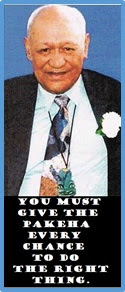One of the most confronting cultural shibboleths
that surfaces now and then amongst some Pākehā is that Māori people and our
culture are going to die out. This belief builds on earlier ideas of ‘fatal impact theory’, whereby ‘inferior’ races were supposed
to have melted away as a result of European contact.
As early as the 1830s, Englishman Edward
Markham wrote: “In New Zealand the same as in Canada or North America, and in Southern
Africa the Hottentots are a decreasing people … my belief is the Almighty
intended it should be so or it would not have been allowed. Out of Evil comes
Good.”
He was famously echoed in 1856 by physician and politician Dr
Isaac Featherston who said it was the duty of Europeans to “smooth down … [the] dying pillow” of the
Māori race.
Then in 1868
a
Wellington newspaper editor wrote in tones of surprised outrage: “They are determined to fight, and we, in
self-protection, must treat them as a species of savage beasts which must be
exterminated to render the colonisation of New Zealand possible.”
The
usefulness of racial theories like fatal impact, monogenism, polygenism and social Darwinism was
that they upheld the European self-image as the most advanced of all races and
eased any doubts about the morality of their attempt to take over the world.
In that
regard, usefulness was always more important than accuracy. For example,
polygenists once claimed that different races could not interbreed, or at least
that mixed-race people would be infertile. Wrong.
And in 1863
the geologist Ferdinand
Von Hochstetter managed the logically impossible feat of being monogenist,
polygenist and social Darwinist in a single chapter when he wrote, “Richly endowed by nature … the Māori is
fully aware of his progress in moral improvement and culture; yet he is not
capable of attaining the full height of a Christian civilized life; and it is
from this very incompleteness, that his race is doomed to gradual extinction …”
Wrong again.
Although the
belief that Māori and our culture ought to die out lost popularity from about
1914, many continued to believe that we would survive only as a ‘golden tinge’
on the skins of the Pākehā;
and the belief itself did not die out.
Instead it went underground from whence it re-emerges occasionally in various
racist guises.
In 2012, a
rich ACT Party donor confidently and publicly claimed that all white New
Zealanders "don't like the Māoris." And just last week, a commenter on a Radio
New Zealand story titled PM defends ‘racist’ TVNZ survey wrote,
“Whatever, the future is clear Māori
culture will die away...”
Confronted
with the incurably racist culture of such people, Whina
Cooper’s advice to Māori was that we ought to marry them until they died
out, while McCully Matiu’s advice
was that we ought to give them every chance to do the right thing.
My own
thought is that while we combat their racism using their laws and ours, we also ought to work with non-racist Pākehā, like those from Network Waitangi, who are very able
and willing to confront the culture from which racism came.


No comments:
Post a Comment